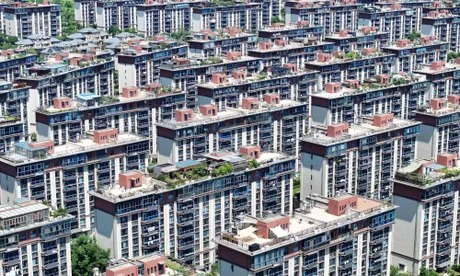When finding a job feels as unlikely as winning the lottery, playing the actual lottery may seem like a more productive use of time. In the first half of 2023, faced with a struggling economy, Chinese consumers spent 273.9bn yuan ($37bn/£30bn) on lottery tickets, an increase of more than 50% on the same period in 2022.
It’s just the latest symptom of an economy in distress. A record high youth unemployment rate of 21.3% in June prompted the government to stop publishing data on the issue – along with other areas such as the consumer confidence index – all which showed China’s economy was struggling.
Several factors have contributed to the unusually high youth unemployment rate. Education, real estate and technology – industries that graduates previously flocked to – have been hit by a regulatory storm in recent years which annihilated millions of jobs. And during the Covid-19 pandemic, more students stayed in education while the jobs market was all but frozen, leading to a pent-up supply of recent graduates on the jobs market.
But the bigger problems for the Chinese economy may be structural. Most of the people in the youth unemployment cohort are not recent college graduates but school leavers who are unable to get the types of service-sector jobs that have previously kept China’s cities buzzing. Millions of would-be hospitality workers, security guards, couriers and nannies are unemployed. Educated, creative college graduates going without work is a problem for a “politically significant part of the workforce”, says Eli Friedman, a professor who focuses on Chinese labour issues at Cornell University, but the fact that people are not finding more low end jobs is the “big concern”.
Since 2013, as factories have moved to countries with cheaper labour, the number of people employed in manufacturing has been in decline. That has led to an “era of polarisation”, according to a study published by economists at Stanford and Wenzhou universities, in which wages have risen for high-skilled professionals, while the surplus of workers at the low-skilled end of the economy has driven down wages.
Between 2004 and 2019, the share of people working in China’s cities in the informal sector grew from 33% to about 60%. As well as contributing to yawning inequality, this hampers China’s ability to boost its productivity rates. “You don’t turn yourself into a high-income country with [close to] 70% of your economy in the informal sector,” says Scott Rozelle, an economist who led the wage polarisation study.
‘A peculiar time to be cutting entitlements’
Another problem created by the explosion in China’s informal sector is that it inhibits the ability of local governments to collect taxes. Personal income tax accounts for just 6% of China’s total tax revenues, compared with 24% in OECD countries. Only a tiny fraction of the country’s population pay any income tax at all.
As a result, local governments are forced to rely on non-tax sources of revenue, such as land sales. Between 2012 and 2021, the share of local government revenues that came from land sales increased from 20% to 30%.
But in 2020, armed with the mantra that “houses are for living in, not for speculation”, the government unleashed a wave of regulatory shocks to the real estate sector, prompting a record number of defaults and the worst slump in the housing market in the 21st century. That was bad news for local governments, which saw their land sale revenues fall by nearly a quarter in 2022.
The slumping revenues exposed a problem that has been brewing for years. China’s provincial governments have all but run out of money. Local government debt is estimated to total $23tn, and 22 municipalities are at medium or high risk of default, according to MacroPolo, a thinktank. The effects are already being felt across China.
In Hegang, a frosty coal-producing town near the Russian border, residents were left without heating, which is normally subsidised by the government, after the city made history by becoming the first to undergo fiscal restructuring in December 2021.
In February, the public bus operator in Shangqiu, a city of 7 million people in Henan province, said it was suspending services as it had run out of money to pay wages, insurance contributions or even to charge the electric buses.
In a bid to balance the books, Beijing has encouraged local governments to slash welfare payments, prompting pensioner protests earlier this year. With a rapidly ageing population and an already weak social safety net, it is a “peculiar time to be cutting entitlements”, Houze Song, a MacroPolo fellow, has noted, especially because reducing benefits encourages people to stash away their money, hurting consumption.
And so China’s economic problems risk falling into a vicious circle, where weak demand drags down employment and public revenue, which – in the absence of a free market – undermines the ability of the state to support jobs and economic confidence.

































